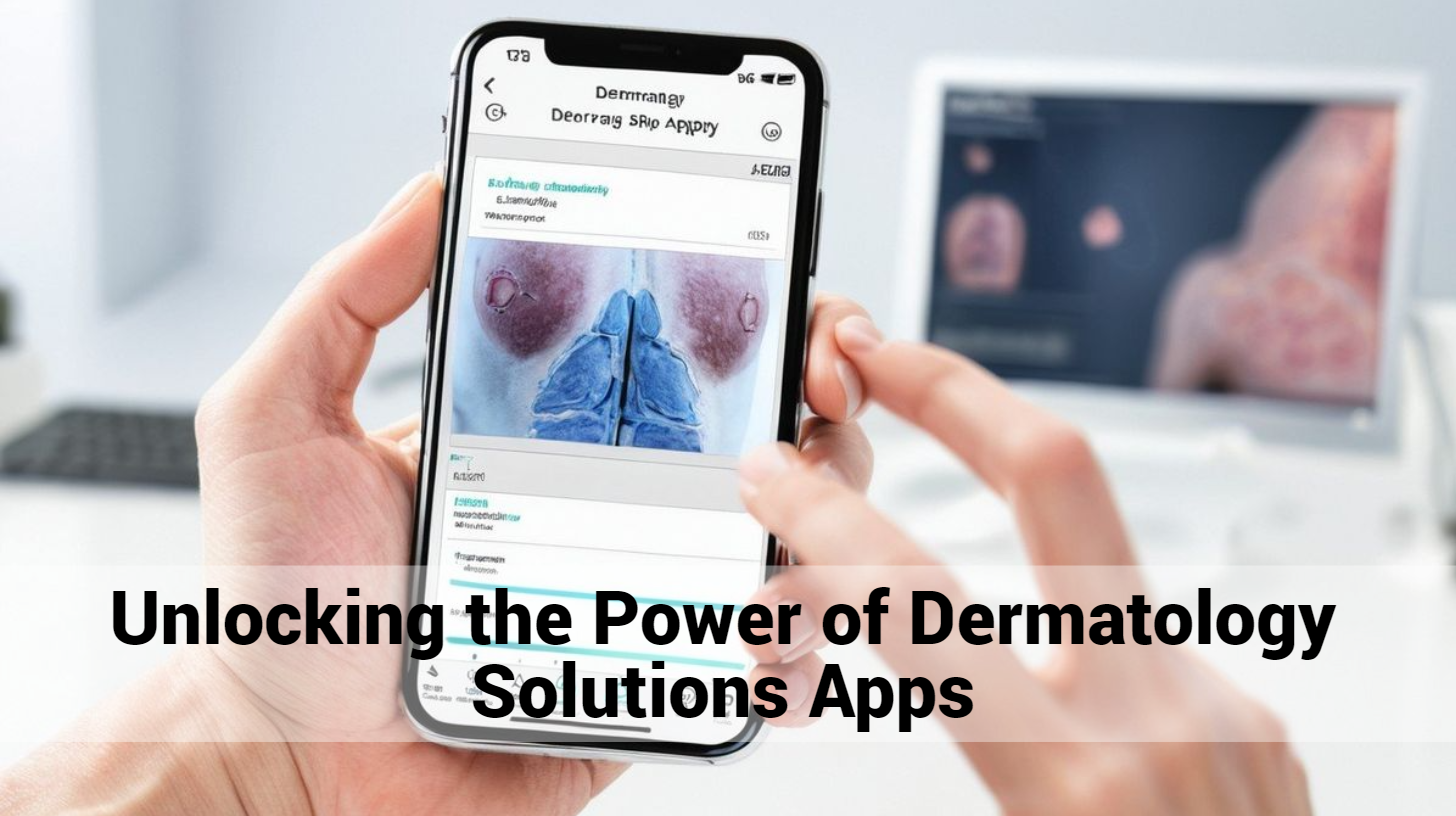In recent years, advancements in technology have revolutionized the field of dermatology, making skin care solutions more accessible and efficient than ever before. Dermatology solutions apps have emerged as invaluable tools, offering a wide range of features to address various skin concerns and provide personalized care. In this article, we delve into the world of dermatology solutions apps, exploring their features, benefits, and how they are shaping the future of skincare.
Understanding Dermatology Solutions Apps
Dermatology solutions apps are mobile applications designed to offer users access to dermatological care and solutions from the convenience of their smartphones or tablets. These apps encompass a broad spectrum of functionalities, ranging from symptom assessment and diagnosis to treatment recommendations, skincare routines, and even telemedicine consultations with dermatologists.
Key Features of Dermatology Solutions Apps
- Symptom Assessment: Dermatology apps typically include symptom assessment tools that allow users to input their skin concerns and receive personalized recommendations based on their symptoms.
- Skin Analysis: Many apps feature skin analysis tools that analyze users’ skin conditions, such as dryness, acne, or pigmentation, using advanced imaging technology.
- Treatment Recommendations: Based on the user’s symptoms and skin analysis, dermatology apps provide tailored treatment recommendations, including over-the-counter products, prescription medications, and home remedies.
- Skincare Routines: Dermatology solutions apps often offer customized skincare routines tailored to users’ specific skin types, concerns, and goals.
- Telemedicine Consultations: Some apps facilitate telemedicine consultations, allowing users to connect with board-certified dermatologists remotely for professional advice and treatment plans.
Benefits of Dermatology Solutions Apps
- Convenience: Dermatology apps offer users the convenience of accessing dermatological care anytime, anywhere, without the need for in-person appointments.
- Personalization: These apps provide personalized solutions and recommendations tailored to users’ unique skin concerns and goals.
- Cost-Effectiveness: Dermatology solutions apps offer cost-effective alternatives to traditional dermatological care, often at a fraction of the cost of in-person consultations.
- Education: Users can learn more about their skin conditions, treatment options, and skincare best practices through educational resources and content available within the apps.
- Accessibility: Dermatology apps make dermatological care more accessible to individuals who may have limited access to dermatologists or skincare specialists in their area.
Eczemaless App: The Ultimate Dermatology Solution
Eczemaless stands out as the premier choice for dermatology solutions due to its comprehensive approach to managing eczema and related skin conditions. Here’s why Eczemaless is considered the best in its class:
- Advanced AI Technology: Eczemaless harnesses the power of advanced artificial intelligence (AI) technology to provide personalized solutions for eczema management. Its innovative algorithms analyze user data and symptoms to offer tailored recommendations for treatment and skincare routines.
- Customized Care Plans: Unlike one-size-fits-all approaches, Eczemaless creates customized care plans based on individual needs and preferences. Whether it’s identifying triggers, recommending suitable products, or suggesting lifestyle changes, Eczemaless offers personalized solutions for optimal skin health.
- Symptom Tracking and Monitoring: Eczemaless allows users to track their symptoms and monitor their progress over time. By logging flare-ups, improvements, and changes in skin condition, users gain valuable insights into their eczema patterns and can adjust their care plans accordingly.
- Education and Resources: Eczemaless goes beyond symptom management by providing users with comprehensive educational resources on eczema. From articles and guides to expert tips and FAQs, Eczemaless empowers users with the knowledge they need to understand their condition and make informed decisions about their skincare.
- User-Friendly Interface: Eczemaless boasts a user-friendly interface that makes navigating the app effortless. With intuitive features and clear instructions, users can easily input data, access recommendations, and track their progress with ease.
- Community Support: Eczemaless fosters a supportive community where users can connect with others facing similar challenges. Through forums, discussion boards, and peer support groups, users can share experiences, exchange advice, and find solidarity in their eczema journey.
- Professional Guidance: Eczemaless offers users the option to seek professional guidance from dermatologists and skincare experts through telemedicine consultations. This feature ensures that users receive personalized care and expert advice tailored to their specific needs.
Track and Manage your Eczema treatment using a comprehensive Eczema App
Download Eczemaless now
The Future of Dermatology Solutions Apps
As technology continues to advance, the future of dermatology solutions apps holds promising developments that are set to revolutionize the field of skincare. Here are some key innovations and trends shaping the future of dermatology solutions apps:
- AI-Powered Diagnosis and Treatment: Artificial intelligence (AI) algorithms will play an increasingly significant role in dermatology solutions apps, enabling more accurate diagnosis and treatment recommendations. AI-driven image analysis and machine learning models will enhance dermatologists’ ability to identify skin conditions remotely and provide personalized treatment plans.
- Telemedicine and Remote Consultations: Telemedicine will become more prevalent in dermatology solutions apps, allowing patients to consult with dermatologists remotely. Virtual appointments, real-time video consultations, and secure messaging platforms will facilitate seamless communication between patients and healthcare providers, improving access to dermatological care for individuals in remote or underserved areas.
- Personalized Skincare Regimens: Dermatology solutions apps will offer more personalized skincare regimens tailored to individual skin types, concerns, and preferences. Advanced algorithms will analyze users’ skin conditions, lifestyle factors, and environmental influences to create customized skincare routines that address specific needs and goals.
- Wearable Technology Integration: Wearable devices and sensors will be integrated into dermatology solutions apps to monitor skin health and track treatment progress. Smart sensors capable of analyzing skin moisture levels, UV exposure, and other environmental factors will provide valuable data for personalized skincare recommendations and disease management.
- Virtual Reality (VR) and Augmented Reality (AR) Applications: Virtual reality (VR) and augmented reality (AR) technologies will enhance patient education and engagement in dermatology solutions apps. VR simulations and AR overlays will enable users to visualize skin conditions, treatment outcomes, and skincare routines in immersive and interactive experiences, improving understanding and adherence to treatment plans.
- Blockchain for Secure Data Management: Blockchain technology will be leveraged to ensure secure data management and patient privacy in dermatology solutions apps. Decentralized storage, encryption protocols, and smart contracts will protect sensitive medical information, facilitating secure sharing of patient data between healthcare providers and patients while maintaining confidentiality and compliance with regulatory standards.
- Integration with Home Devices: Dermatology solutions apps will integrate with home devices and IoT (Internet of Things) platforms to enhance user experience and treatment efficacy. Smart skincare devices, such as UV monitors, acne treatment devices, and skincare analysis tools, will sync with dermatology solutions apps to provide real-time data and insights for personalized skincare management.
Overall, the future of dermatology solutions apps holds immense potential to transform the way we approach skincare and dermatological care. By harnessing the power of AI, telemedicine, personalized skincare regimens, wearable technology, VR/AR applications, blockchain, and home device integration, these apps will empower individuals to take control of their skin health and access high-quality dermatological care from the comfort of their homes.
Conclusion
Dermatology solutions apps are transforming the way individuals approach skincare, offering personalized solutions, convenient access to care, and valuable educational resources. With their advanced features and user-friendly interfaces, these apps empower users to take control of their skin health and achieve their skincare goals with confidence. As technology continues to evolve, dermatology solutions apps are poised to play an increasingly integral role in the future of skincare and dermatological care.
GET IN CONTROL OF YOUR ECZEMA
Use our AI tool to check the severity of Eczema and keep track of your Eczema progress.


